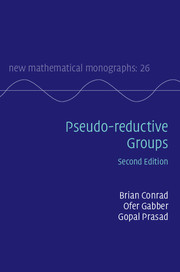Book contents
- Frontmatter
- Dedication
- Contents
- Preface to the second edition
- Introduction
- Terminology, conventions, and notation
- PART I Constructions, examples, and structure theory
- PART II Standard presentations and their applications
- PART III General classification and applications
- PART IV Appendices
- A Background in linear algebraic groups
- B Tits' work on unipotent groups in nonzero characteristic
- C Rational conjugacy and relative root systems
- References
- Index
B - Tits' work on unipotent groups in nonzero characteristic
from PART IV - Appendices
Published online by Cambridge University Press: 05 June 2015
- Frontmatter
- Dedication
- Contents
- Preface to the second edition
- Introduction
- Terminology, conventions, and notation
- PART I Constructions, examples, and structure theory
- PART II Standard presentations and their applications
- PART III General classification and applications
- PART IV Appendices
- A Background in linear algebraic groups
- B Tits' work on unipotent groups in nonzero characteristic
- C Rational conjugacy and relative root systems
- References
- Index
Summary
In our study of pseudo-reductive groups, we need to use some fundamental results of Tits (building on earlier work of M. Rosenlicht [Ros1], [Ros2]) concerning the structure of smooth connected unipotent groups and torus actions on such groups over an arbitrary (especially imperfect) ground field of nonzero characteristic. These results were presented by Tits in a course at Yale University in 1967, and lecture notes [Ti1] for that course were circulated but never published. Much of the course was concerned with general results on linear algebraic groups that are available now in many standard references (such as [Bo2], [Hum2], and [Spr]).
The only previously available written account (with proofs) of Tits' structure theory of unipotent groups is his unpublished Yale lecture notes, though a summary of the statements of his results is given in [Oes, Ch. V]. In this appendix we give a self-contained development of the theory, with complete proofs, and in some parts we have reproduced arguments from Tits' lecture notes whereas in other parts we provide new proofs that are shorter and simpler. We go beyond what we need in order that this appendix may serve as a useful general reference on Tits' work on this topic.
Throughout this appendix, k is an arbitrary field with characteristic p > 0, except in Proposition B.4.6.
Subgroups of vector groups
A smooth connected solvable k-group G is k-split if it admits a composition series whose successive quotients are k-isomorphic to Ga or GL1. In the case of tori this is a widely used notion, and it satisfies convenient properties, such as: (i) every subtorus or quotient torus (over k) of a k-split k-torus is k-split, (ii) every k-torus is an almost direct product of its maximal k-split subtorus and its maximal k-anisotropic subtorus. However, in contrast with the case of tori, it is not true for general smooth connected solvable G that the k-split property is inherited by smooth connected normal k-subgroups:
Example B.1.1 Suppose that k is imperfect and choose a ∈ k − kp.
- Type
- Chapter
- Information
- Pseudo-reductive Groups , pp. 561 - 580Publisher: Cambridge University PressPrint publication year: 2015



